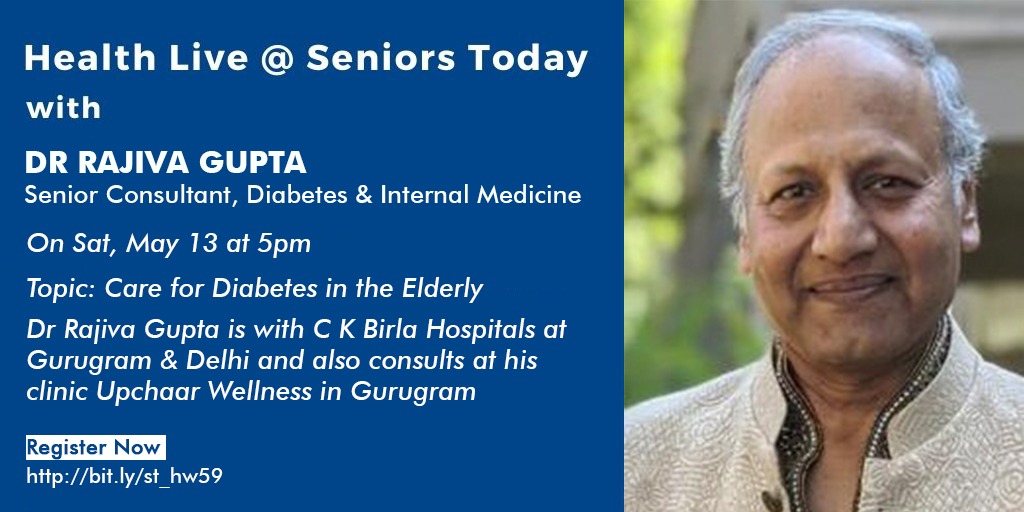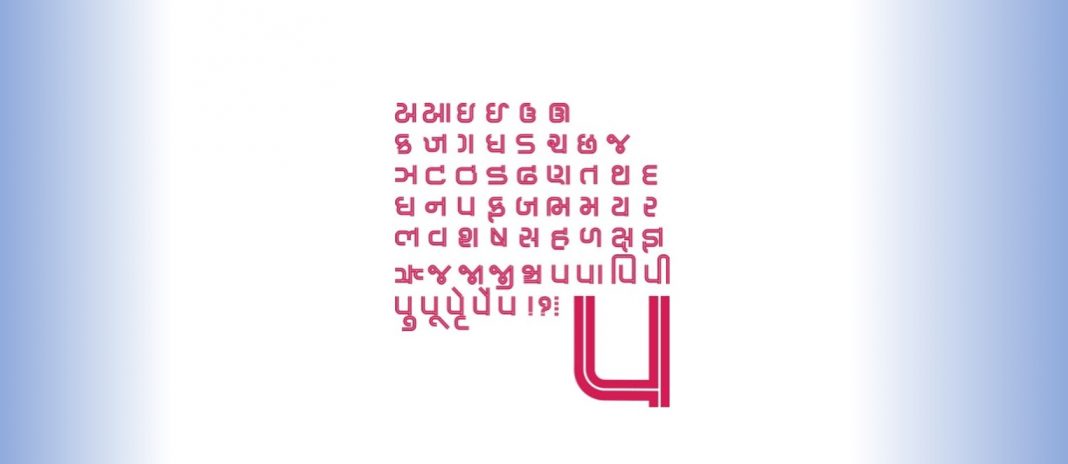On 12 May, 2023, Seniors Today hosted their weekly Health Live webinar with a Veteran Diabetologist Dr. Rajiva Gupta who spoke on and answered questions about Care for Diabetes in the Elderly.
About Dr Rajiva Gupta: Dr Rajiva Gupta is a Senior Consultant in Internal Medicine and Diabetes with an experience spanning over 40 years. He did his MBBS from Maulana Azad Medical College, New Delhi and MD from Dr. Ram Manohar Lohia Hospital, New Delhi (now called PGIMER – Post Graduate Institute of Medical Education & Research, University of Delhi). He has also done a Post Graduate Program in Diabetology from the Johns Hopkins University School of Medicine, USA and a Specialist Certificate Course from the International School of Diabetes (IDF).
Dr Gupta currently has consultation practice at his personal clinic Upchaar Wellness in Gurugram as well as affiliated with C K Birla Hospitals at Gurugram and Punjabi Bagh, Delhi.
He has been practising earlier at his clinic in Ashok Vihar , Delhi and has been affiliated with major hospitals like Fortis Hospital, Shalimar Bagh, Max Super Speciality Hospital Shalimar Bagh, Delhi Heart and Lung Institute New Delhi etc.
Dr Gupta has conducted CME (continuing medical education) programmes in the fields of internal medicine with special focus on diabetes, clinical cardiology, and geriatrics and given lectures and conducted certified courses on various topics in diabetology, cardiology, critical care , geriatrics and Covid-19.
He has attended several national and international symposia, conferences and workshops under the auspices of leading organisations and institutions like Harvard University, American College of Cardiology, Cleveland Clinic, European Society of Hypertension , Indian Thyroid Society, American Diabetes Association, American Society of Hypertension etc.
Dr Rajiva Gupta has been an active researcher having participated in several national and global clinical trials in the fields of diabetes and cardiology. He is a member of several prestigious professional organizations like the Endocrine Society, American Diabetes Association, American Association of Clinical Endocrinologists, American College of Physicians
American College of Cardiology, Research Society for the Study of Diabetes in India , Geriatric Society of India etc. He has contributed articles in the fields of Vitamin D , Insulin therapy, Geriatrics in reputed journals.
Dr Rajiva Gupta has written a book “Stress & Diabetes: The Underappreciated Connection” published by the Pendown Press, New Delhi which was released at the New Delhi World Book Fair on February 25, 2023.
The people of age 65 years and above comprise 6.8% of the total population in India according to the census of the World Bank Data in the year 2021. And out of these, more than 30% of the people over the age of 65 years are suffering from diabetes in India.
These numbers are high/ the prevalence of diabetes in India is high due to the ageing of the predominant population.
Management of diabetes in the elderly is rather complex. Because in this age group, there are people who are robust and healthy and on the other end of the spectrum there are also people who are frail with multiple comorbidities, age related geriatric issues in addition to the complications associated with diabetes. This robust diversity in population is the reason for the management of diabetes mellitus in the elderly being complex.
There is a differential risk of complications which depends on when the diagnosis of Diabetes Mellitus Type II was made.
People who have been diagnosed with diabetes at an earlier age, such as 45- 50 years, run a higher risk of complications which can affect the kidneys, nerves and eyes.
On the contrary, if the diabetes is diagnosed at a later stage, these individuals have fewer and more specific diabetes related complications. This is because the typical microvascular complications which then further impair the functioning of the kidneys, nerves and eyes are dependent upon the duration of the disease. However, because of the advanced age, individuals of the older age group are at a higher risk of developing macrovascular complications which pertain to heart, brains- stroke, etc.
People with diabetes are at a high risk of:
- Poly- pharmacy. Which is the use of multiple drugs (more than 5 drugs at a time) because of multiple comorbidities.
- Functional disability
- Cognitive impairment- this also depends on the age and progression of disease
- Depression
- Urinary incontinence
- Persistent pain
All these factors are also taken into consideration before deciding on the type and choice of medical therapy most suitable for the patient.
Treatment goals in the elderly:
- Avoid symptoms of hyperglycaemia- high blood sugar. High blood sugar is defined as blood sugar higher than 140mg/dL
- Avoid hypoglycaemia- low blood sugar. Blood sugar less than 70mg/dL
- Prevent acute complications, mainly infectious
- Prevent chronic diabetes related complication, such as those with the eyes, nerves, kidney, heart and brain
- Optimise the health related quality of life
All the treatment goals need to be individualised which are based on the needs and preference of the patient.
Life expectancy of a patient with diabetes mellitus depends on:
- The age of the patient at the time of diagnosis
- Other/ added comorbididties
- Cognitive functions of the individual
- Complications
- Adherence of the patient with the medication and compliance to medical treatment and advise
- Duration of disease
- Availability of resources
- Individuals own motivation
- Family support and support system
Avoiding hypoglycaemia is the corner stone of the management/ objective of treatment of a patient with diabetes.
Elderly people are more prone to hypoglycaemia
Certain oral drugs and all types of injectable insulin have a propensity to cause hypoglycaemia and should be used with caution.
Elderly people who are being treated with dietary changes or are on an exercise programme will require a reduction in the dose to avoid hypoglycaemia. This is paradoxical, because on the one hand we advise patients to restrict their diet and encourage physical activity, as the oral hypoglycaemic drugs start to work/ show their effect, in addition to the lifestyle changes can lead to drastic and unwanted fall in the blood sugar levels.
Risk factors for hypoglycaemia:
- Poor cognitive function
- Compromised kidney function- this is one of the most common risk factors
- Compromised liver function
- Therapy with Insulin, sulphonylureas
- Previous episodes of hypoglycaemia
- After discharge from hospital- illness / cause for hospitalisation also adds to the risk
- Poly- pharmacy
- Depression- by contributing due to the erratic meal consumption, inability to exercise
- Inadequate nutrition
- Heart failure
In a normal individual, if the blood sugar levels are low, there is a cascade of chemical reactions and responses that kick in, to bring the blood sugar back.
However, these responses are not as sharp in the elderly.
Hypoglycaemia is also a perception, based on the symptoms- such as feeling light headed, generalised weakness, confusion.
Similarly, hyperglycaemia is also dangerous to the patient. Management of hyperglycaemia is important since failure to do so can land the patient up in dehydration, urinary incontinence, fatigue, leathery, visual impairment, risk of falls, increased risk of infection, poor wound healing, overall decline in health.




